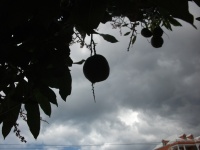Acerola Cherry; Super Food; Super Nutrition
Posted by Trudy Prevost on December 11, 2018
According to natural products industry insiders, a significant amount of the global supply of acerola material is reportedly adulterated with exogenous L-ascorbic acid, some of which may be chemically synthesized and/or produced from genetically engineered starting materials. For many years, L-ascorbic acid had been produced mainly by chemical synthesis (Reichstein process), but there are new biotechnological approaches, e.g., involving the epiphytic bacterium Erwinia herbicola (Enterobacteriaceae) strain genetically engineered to contain a gene from the Gram-positive bacterium Corynebacterium spp. (Corynebacteriaceae), which converts glucose to 2-ketogulonic acid and can then be converted to ascorbic acid, among other novel biotech methods.37 Methodologies to determine the presence or absence of biotech or synthetic L-ascorbic acid in acerola products have been developed and validated, including Isotope Ratio Mass Spectrometry (13C-IRMS-AOAC 998.12).38 It is recommended that buyers of natural acerola ingredients and products work with independent laboratories applying this methodology in order to verify authenticity.
According to natural products industry insiders, a significant amount of the global supply of acerola material is reportedly adulterated with exogenous L-ascorbic acid, some of which may be chemically synthesized and/or produced from genetically engineered starting materials. For many years, L-ascorbic acid had been produced mainly by chemical synthesis (Reichstein process), but there are new biotechnological approaches, e.g., involving the epiphytic bacterium Erwinia herbicola (Enterobacteriaceae) strain genetically engineered to contain a gene from the Gram-positive bacterium Corynebacterium spp. (Corynebacteriaceae), which converts glucose to 2-ketogulonic acid and can then be converted to ascorbic acid, among other novel biotech methods.37 Methodologies to determine the presence or absence of biotech or synthetic L-ascorbic acid in acerola products have been developed and validated, including Isotope Ratio Mass Spectrometry (13C-IRMS-AOAC 998.12).38 It is recommended that buyers of natural acerola ingredients and products work with independent laboratories applying this methodology in order to verify authenticity.



Leave a comment